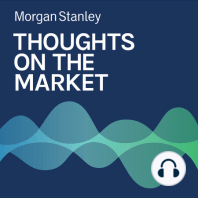4 min listen
ESG: A New Framework for Utilities
ratings:
Length:
5 minutes
Released:
Oct 13, 2022
Format:
Podcast episode
Description
Increasing ESG pervasiveness has led to increasing confusion, in particular around how investors might apply these criteria to the utility sector. Head of Sustainability Research and Clean Energy Stephen Byrd and Equity Analyst for the Power and Utilities Industry Dave Arcaro discuss. ----- Transcript -----Stephen Byrd Welcome to Thoughts on the Market. I'm Stephen Byrd, Morgan Stanley's Global Head of Sustainability Research and Clean Energy.Dave Arcaro And I'm Dave Arcaro, Equity Analyst for the Power and Utilities Industry.Stephen Byrd And on this special episode of the podcast, we'll be discussing a new framework for investors to approach ESG analysis within the utility space. It's Thursday, October 13th, at noon in New York.Stephen Byrd Our listeners are no doubt well aware that ESG criteria—that is environmental, social and governance criteria—have become an increasingly important part of the investment process. This growth has been spurred by a continual search for better long term financial returns, as well as a conscious pursuit of better alignment with values. Yet despite ESG's seeming pervasiveness within the financial ecosystem, there's been a genuine confusion and even controversy among investors about how to apply ESG metrics to the utility sector in particular. And so, in an effort to bring clarity to this key market debate, today we're going to share an innovative framework designed to drive both Alpha, which is the returns aspect, and impact, which is the societal benefit. So Dave, let's start with the problem. What causes this investor confusion and how does the new ESG framework address this problem?Dave Arcaro There are a few sources of confusion or debate that we're hearing from investors. The first seems to be centered on the lack of a clear distinction between ESG criteria that are likely to have a direct impact on stock performance, and then those that are more focused on achieving the maximum positive impact on ESG goals. Secondly, there is too much focus directly on carbon emissions, and there isn't enough focus on the social and governance criteria in the utility space. These can also have an impact on stocks and on key utility constituents, things like lobbying, operations, customer relationships. The new ESG framework that we've introduced here addresses these issues. It expands the environmental assessment, incorporates specific social and governance criteria that are most relevant for utilities, like customer and lobbying metrics, and it adds a new perspective. For each of these metrics, we assess which ones truly have an impact on alpha generation and which ones have the largest purely societal impact.Stephen Byrd And stepping back, Dave, we've seen that the utility sector is arguably the best positioned among the carbon heavy sectors in terms of its ESG potential. Can you walk us through that thought?Dave Arcaro Utilities are in a unique position because they can often create an outcome in which everybody wins when it comes to decarbonizing. This is because when utilities shut down coal and replace it with renewables, it often has three benefits; carbon emissions decline, customer bills are reduced because renewables have gotten so cheap and the utility also grows its earnings. So, it's a strong incentive for utilities to set ambitious plans to decarbonize their fleets.Stephen Byrd Now Dave, typically, when considering the E, that is environmental criteria, ESG analysis tends to focus solely or primarily at least on carbon dioxide. Is this a fair approach or should investors be considering other factors?Dave Arcaro We think other factors should come into play here, and we recommend investors consider the rate of change in carbon emissions, the CO2 intensity of the fleet, risks from climate change, and also impacts on biodiversity. Some of these are more readily available than others, but we think the environmental assessment should expand beyond a simple look at carbon emissions.Dave Arcaro So,
Released:
Oct 13, 2022
Format:
Podcast episode
Titles in the series (100)
Mike Wilson: Weighing a Potential Fed Rate Cut by Thoughts on the Market
